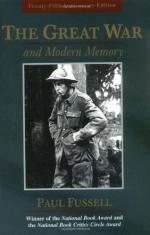
|
| Name: _________________________ | Period: ___________________ |
This test consists of 5 multiple choice questions, 5 short answer questions, and 10 short essay questions.
Multiple Choice Questions
1. At what age did Robert Grave's enter the military?
(a) Nineteen.
(b) Eighteen.
(c) Twenty.
(d) Sixteen.
2. Within writings, there are many comparisons of soldiers as sheep being led where?
(a) Fields.
(b) Sheerer.
(c) Slaughter.
(d) Trenches.
3. Fussell mentions that some people thought that a certain language was not adequate enough to deal with war. Which language is it?
(a) Spanish.
(b) English.
(c) French.
(d) German.
4. What did the rose mean to many people in England?
(a) Imagination.
(b) Inspiration.
(c) Beauty.
(d) Loyalty.
5. What do some writers like George Adam's associate the military with?
(a) Literature.
(b) Ritual.
(c) Myth.
(d) Theater.
Short Answer Questions
1. What type of bird is associated with dawn?
2. One movement that occurred in England at the time of the Great War promoted a belief that education should consist of classical and English _____.
3. The eighteen square mile enclosure in which troops were trapped and subject to shelling from all sides is Fussell's example of _____.
4. Shortly after Graves is released from the hospital the second time, he gets married. What month and year does he get married?
5. What are there many things pastoral in the literature about?
Short Essay Questions
1. Describe the way Fussell uses euphemisms to describe various things.
2. Give examples of words or phrases that stemmed from the war.
3. Describe Robert Graves military life in his book, Goodbye to All That.
4. Give some examples of how writers associate the military with theater?
5. Describe the two movements that coincided in England at the time the Great War occurred.
6. In Anthony Burgess' book The Wanting Seed, the main character is Tristram Fox, who is in the military and decides the war is a farce and a fake. What happens when Tristram serves on the front line?
7. How are elegies based on the pastoral?
8. What is so special about blond males in most wartime literature? Name some authors who wrote about blond males.
9. What sorts of things are considered pastoral in the literature about the war?
10. How have gardens always been an important factor in English literature and the word pastoral applies to war literature?
|
This section contains 782 words (approx. 3 pages at 300 words per page) |

|




